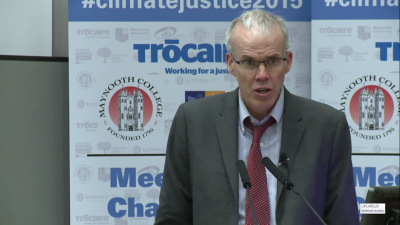 “The power of the fossil fuel industry needs to be broken,” climate justice campaigner and 350.org founder Bill McKibben told delegates at the climate justice conference held in Maynooth on June 22nd 23rd.
“The power of the fossil fuel industry needs to be broken,” climate justice campaigner and 350.org founder Bill McKibben told delegates at the climate justice conference held in Maynooth on June 22nd 23rd.
Addressing delegates at the ‘Meeting the Challenge of Climate Justice: From Evidence to Action’ conference, McKibben said that the fossil fuel industry was threatening the safety and security of the planet. He described it as “the most irresponsible industry we have ever seen on the planet”.
McKibben warned of the “planetary dislocation” that is taking place and said that the only way to halt a global temperature rise of more than two degrees Celsius is to “break the power of the fossil fuel industry”.
“They are no longer normal companies,” he said. “We must turn them into the pariahs they must become. If we follow the business plan of the fossil fuel industry, we will go far beyond a two degree temperature rise. If they do what they have said they will do, the planet will break.”
Professor Jean Pascal van Ypersele, Vice-Chair of the Intergovernmental Panel on Climate Change (IPCC), warned that levels of carbon in the atmosphere today are unprecedented. He outlined how for 800,000 years the levels of carbon in the atmosphere varied between 180-280 parts per million (ppm) but now stands at 400ppm.
Professor van Ypersele described the “hidden message” of the IPCC reports as being the complete lack of political will to tackle an issue that presents a threat to all forms of life on earth. Limiting global temperature rises to 2 degrees Celsius would be an enormous challenge given that two-thirds of the level of carbon compatible with restricting temperature rises to 2 degrees has already been emitted, he said.
Bishop Theotonius Gomes, Auxiliary Bishop of Dhaka in Bangladesh, outlined the threats facing his country as a result of climate change. It is estimated that a one metre sea level rise would displace 30 million people in Bangladesh. Bishop Gomes warned: “We will have to return much of Bangladesh to the sea” unless there is an urgent change in attitudes to tackling the climate problem. “We must face the reality that industrial activity is disturbing masses of people in places like Bangladesh,” said Bishop Gomes.
Columban eco-theologian Fr Seán McDonagh spoke about the ecological impacts of climate change, warning that vast numbers of species are going extinct as a direct result of human behaviour. Fr. McDonagh quoted research published last week which showed that the earth is currently experiencing its sixth extinction phase. He warned that humanity was changing the planet faster than evolution could adapt, which was driving vast numbers of species into extinction. He warned that humanity is bringing about ecological changes in just 100 years that would take 20 million years to come about naturally.
Dr. David Mkwambisi of Lilongwe University in Malawi warned of the impacts of climate change on farming communities in the developing world. It was not possible to farm when you did not know when to plant or when to harvest, he said. “Dry spells are coming at different times and causing food insecurity in many households across the country,” he warned.
See the Trócaire website to find out more about what was said at the conference.
